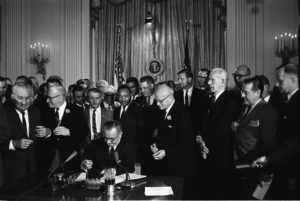|
Listen to this Article
|
Editor’s Note: As San Francisco Bay Area civil rights and discrimination attorneys, we often get queries from the public about civil rights issues in the news. In this post we address President Donald Trump’s recent hints that he may pardon former Sheriff Joe Arpaio, who is currently in jail for violating the civil rights of Americans in violation of a court order. We feel that such a pardon may undermine other efforts to enforce civil rights laws.

Understanding Arpaio’s recent career is vital to grasping the significance of his conviction. Starting in 2005, Arpaio’s racially-targeted enforcement of immigration law became controversial. One Department of Justice report determined that his policies were the worst pattern of racial profiling in United States history. His obsession with immigration enforcement even obscured the enforcement of other laws, including those prohibiting sexual assault and child rape.
Arpaio’s immigration enforcement policies included sweeps of Latino neighborhoods and the detention of individuals solely on the basis of their race. As a result, he was the defendant in two lawsuits, including one brought by the Department of Justice. Despite his department’s effort to criminally investigate the presiding judge, one suit resulted in a federal injunction against his department’s continued use of racial profiling and a $4.4 million dollar judgment against his department.
Despite the injunction, Arpaio declared in 2014 that he would continue the racist immigration policies until he was held in contempt. A federal court granted his wish last month, finding him guilty of criminal contempt. Now, President Trump is considering a pardon.
If President Trump follows through, substantial harm may come to racial minorities in the United States. According to Professor Robert Spitzer, an expert on the subject, presidential pardons usually happen when the president feels “that the person has suffered enough,” that “the person being pardoned was prosecute[d] wrongly” or “subject to a sentence that was out or proportion to the crime,” or that “the person being pardoned has reformed himself.” None of these are the case here. Instead, President Trump would pardon Arpaio for two possible reasons: either (1) due to Arpaio’s early political support for his presidential campaign; or (2) on the basis of his political agreement—that is, because the President believes that Arpaio has done nothing wrong in violating the Constitution. Neither is acceptable; both indicate that racist law enforcement policy is not only acceptable, but that those responsible are can act free from consequences.
Furthermore, the President of the United States intervening to undo a conviction of a public official who violated American citizens’ constitutional rights does unspeakable violence to those rights. Our rights mean little when there is no redress when they are violated—which is precisely what a pardon here would do. During the debates over ratification of the Constitution, James Madison warned us that it is not enough to inscribe our rights on paper; they must live in the hearts of our elected officials. When our elected officials do not value those rights, and when law enforcement is freed to act without regard for them, our Constitution becomes a mere “parchment barrier.”
More Information
If you think your civil rights have been violated, reach out to one of our San Francisco Bay Area civil rights and discrimination attorneys. No two situations of civil rights violations are alike, and – accordingly – this blog post should not be construed as legal advice. That said, with offices in Oakland and San Anselmo, our attorneys make it easy to have a confidential consultation on any potential civil rights violation that you may be facing.


